Best Raspberry Pi HATs 2024: Expansion Boards for Every Project
Raspberry Pi HATs let you add lights, motors, sensors and more.
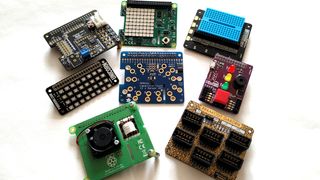
The Raspberry Pi is an awesome platform for learning and experimentation. In its first 11 years it has helped many users learn to code, build robots and monitor the location of the International Space Station (they've even been onboard the ISS!), and so much more. But to make the most of the Pi, it helps to have the right expansion board. Originally the Raspberry Pi didn't have a standard definition for boards. The first official expansion, 2012's GertBoard was larger than the Pi itself. But all this changed when the HAT (hardware attached on top) standard was introduced along with the Raspberry Pi B+ in 2014. It provided a standardized means, similar to Arduino's Shields, to connect the Raspberry Pi’s set of 40 GPIO pins (increased from 26 to 40 with the B+) to add-ons providing functionality such as lights, motors, sensors and fans without a mess of wires. The HAT standard follows a similar standard used by Arduino boards, where they are called "shields". HATs are an easy way to add extra features without connecting a mess of wires.
There are hundreds, if not thousands of Raspberry Pi HATs on the market and most of them will work with any model of Pi that has 40 pins, which is every model launched from 2014, though you’ll need to attach the GPIO pins to the Pi Zero.
If you intend to use a HAT with the Raspberry Pi 400 then you will also need a breakout connector, such as Pimoroni's Flat HAT Hacker HAT. If you are feeling adventurous, you can even use some HATs with the original 26 pin GPIO models of Raspberry Pi or the Raspberry Pi Pico W. Other Raspberry Pi alternative boards may claim compatibility with HATs, but do your research before connecting as you may inadvertently damage the boards.
To help you choose, we’ve listed the best Raspberry Pi HATs that we have personally tested, grouped by their use case. These expansion boards can be used for everything from general learning to implementing A.I. via Machine Learning. Or you could just build your own Raspberry Pi powered robot to explore the world around us.
The release of the Raspberry Pi 5 surprised many, including HAT and addon creators who are still working to patch their boards for use with the latest Raspberry Pi, including the recent Raspberry Pi 5 2GB. The issues that they face are two-fold. Firstly there are changes to how Python works on the Debian 12 Bookworm-based OS. The changes boil down to that we can no longer install Python modules directly to the OS. Instead we need to install into virtual environments. Secondly, due to the new RP1 chip, how the GPIO is accessed has changed. This has lead to many HATs being incompatible with the Pi 5, for now. Progress is being made by developers who maintain the software behind our favorite boards.
Raspberry Pi has released the first HAT+ standard board [PDF], the M.2 HAT+. But we are still some way from a wave of new boards that will use this standard.
Raspberry Pi HAT Shopping Tips
Why you can trust Tom's Hardware
When buying a Raspberry Pi HAT, ask yourself these questions:
- What is the HAT for? If it’s for a particular project, does it do what you need it for? If it is for a child, does the HAT have enough features to grow with their learning?
- Does the HAT work with your Raspberry Pi? Every Raspberry Pi since 2014’s Raspberry Pi B+ features a 40 pin GPIO, and all HAT boards are designed for that. Raspberry Pi Zero W users may want to look for pHAT, smaller HATs designed for Zero form factor. If you are using a Raspberry Pi 400 then you will need a breakout board to access the GPIO.
- How can the HAT be programmed? Does it come with a Python module, and is it user friendly? Can it be programmed in another language? Is there documentation to support your learning?
- Does the HAT use all your pins? While most Raspberry Pi HATs physically cover all 40 GPIO pins, many of them allow a pass-through so you can use many of those pins with other devices or even another HAT stacked on top of the first one.
Best Raspberry Pi HATs at a glance:
- Pimoroni Inventor HAT Mini
- Build HAT
- Pimoroni IO Expander
- Pimoroni Picade X
- Raspberry Pi Sense HAT
- Pimoroni Breakout Garden
- Raspberry Pi PoE HAT
- Google AIY Voice HAT
- Cyntech Pibrella
- Adafruit Perma-Proto HAT
- Adafruit Capacitive Touch HAT
- Raspberry Pi M.2 HAT+
Best Raspberry Pi HATs
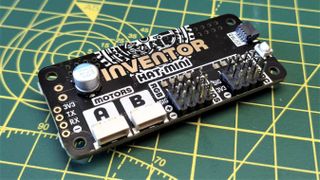
1. Pimoroni Inventor HAT Mini
Specifications
Reasons to buy
Reasons to avoid
Taking over from Pimoroni’s Explorer HAT Pro is a tough task, but this little board does an excellent job of incorporating lots of features into a small package.
Providing connections for up to four servos, two DC motors (via a DRV8833 motor controller), eight tiny, but bright RGB “NeoPixel” LEDs and an audio connection, this little board is packed full of fun.
All of this hardware is nothing without a companion software package and Pimoroni has stepped up to the plate and delivered. The Python module is easy to use and abstracts away the complexities of controlling the various forms of hardware.
The Inventor HAT Mini is a great board at a low price. Well worth your time and money.
MORE: Pimoroni Inventor HAT Mini Review
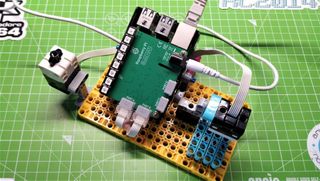
2. Build HAT
Our expert review:
Specifications
Reasons to buy
Reasons to avoid
Merging Lego and Raspberry Pi together is a genius idea. Build HAT works with all 40-pin models of Raspberry Pi and it enables the use of LPF2 components, such as motors and sensors from the Spike, Mindstorms and Technic range of kits.
With four LPF2 connectors, we can easily add a combination of Lego components to build robots and elaborate sensor-controlled devices. When we tested Build HAT we found that the accompanying Python library abstracts the complexities of using the components, providing a frictionless approach to Python powered Lego projects. This is a great board to introduce coding concepts to children who have grown past block based coding, as the use of Lego provides a familiar construction material.
Read: Raspberry Pi Build HAT Review
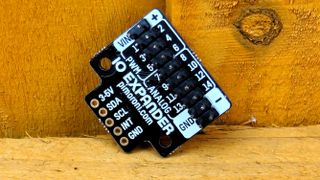
3. Pimoroni IO Expander
Specifications
Reasons to buy
Reasons to avoid
Whether you need more GPIO pins or your project needs analog inputs, the IO Expander from Pimoroni is a cost effective and simple means to do just that for $10. The IO Expander provides up to 14 extra GPIO pins, with all offering digital input / output, six with PWM (Pulse Width Modulation), useful for precise control of motors, and eight analog inputs to be used with electronic components such as potentiometers.
The Pimoroni IO Expander is not a typical add on board for the Raspberry Pi. Measuring a mere 1 x 0.9 inch (25 x 23mm) the board has only five connections which are made to the GPIO. The need for so few connections is due to the IO Expander using I2C, a two wire serial communication protocol. These five pins can be soldered to using the included male / female header pins, then placed atop the I2C pins of the GPIO. This design is not accidental, rather it is deliberate as the IO Expander is part of Pimoroni’s Breakout Garden range of boards.
There is nothing not to like about the Pimoroni IO Expander, which is small in size but big in features and it should be in the bits box of every Raspberry Pi enthusiast.
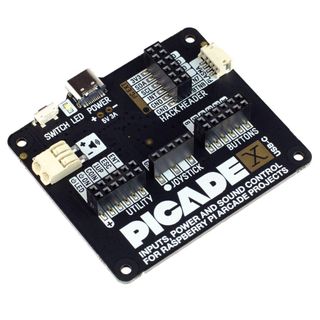
4. Pimoroni Picade X HAT
Specifications
Reasons to buy
Reasons to avoid
If you want to build a retro arcade machine, complete with an arcade joystick and buttons, the Pimoroni Picade X HAT is the board to get. The X HAT has all the connectors you need to attach one joystick, and up to 12 buttons, including those for functions such as adding a coin or 1UP button.
The added “Hack Header” provides a connection to the I2C interface, handy for adding extra components. Picade X HAT also provides sound using an I2S interface via the GPIO and a 3W mono amplifier outputs the audio to an external speaker (sold separately). The Picade X HAT has a USB port that it uses to provide power both to the Pi itself and to any speakers.
The latest version of the Picade X HAT uses a Type-C connector, which means that it provides enough juice to power either a Raspberry Pi 4 or an earlier model. Older versions of the X HAT, which may still be on sale, use a microUSB connector that only has enough juice for a Pi 3 or earlier.
After you install a one-line script, the Picade X HAT works flawlessly in popular emulation platforms such as RetroPie and Lakka, both of which see it as a keyboard where you just assign each button to a function (like you’d assign a keyboard key).
One potential issue with the Picade X HAT is that, because gaming puts a load on your processor and the board covers your CPU, it can trap in heat, which is a particular problem for Raspberry Pi 4s. If you use a stacker to raise the height, you can put a fan or heat sink below it.
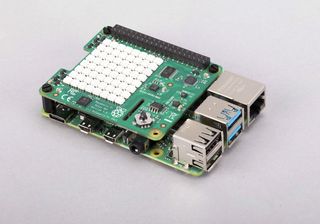
5. Raspberry Pi Sense HAT
Specifications
Reasons to buy
Reasons to avoid
Despite being over five years old, Sense HAT is still the best all-around Raspberry Pi HAT for learning. Featuring onboard temperature, humidity, air pressure, accelerometer, gyroscope and magnetometer sensors can be used in science experiments via Python and Scratch. A joystick and 8 x 8 LED matrix can be used to make and control simple games.
If you’re working with kids or just want to have fun getting started with a Pi, the Sense HAT should be at the top of your shopping list. The amount of learning offered by this board is superb. Two Sense HATs live aboard the International Space Station and every year students compete to have their code run on it . . . from the AstroPi, a Raspberry Pi in space.
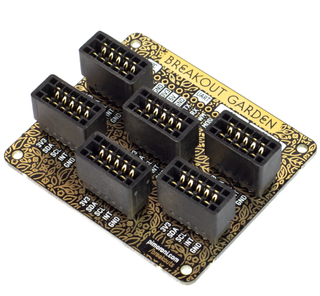
6. Pimoroni Breakout Garden
Specifications
Reasons to buy
Reasons to avoid
The I2C interface is hidden as part of the Raspberry Pi GPIO. It is an alternative configuration of the standard GPIO and it offers advanced users a four wire interface for multiple devices, connected in a chain. Breakout Garden is a Raspberry Pi HAT which offers a simple means to connect I2C devices.
Additional breakout boards, ranging from LED matrices to air quality sensors and thermal cameras slot into one of the six slots and can be easily used thanks to a custom Python 3 library. This is a highly configurable and simple to use base for citizen science projects.
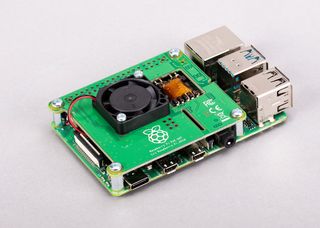
7. Raspberry Pi PoE HAT
Specifications
Reasons to buy
Reasons to avoid
The Raspberry Pi PoE (Power over Ethernet) HAT is compatible only with the 3B+ and 4 and provides a single wire solution for network and powering your project. This Raspberry Pi HAT is extremely useful for installing projects in remote locations, such as in your garden or shopping mall.
Using this HAT also provides us with a cooling fan, useful for the Raspberry Pi in general as it keeps the temperature down, but more so since the release of the Raspberry Pi 4. The PoE HAT fits atop all of the GPIO pins, but an included extension header means that we can connect another board on topsure that there is clearance for the fan.
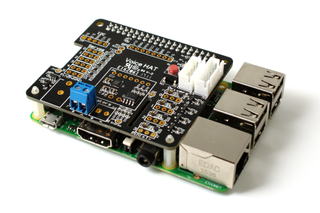
8. Google AIY Voice Kit (with HAT)
Specifications
Reasons to buy
Reasons to avoid
If you have ever wanted to learn Artificial Intelligence or build your own voice assistant, such as Siri, Alexa or Google, then Google’s Aiy Voice Kit is for you. The Voice Kit comes in a simple card box, but inside there is a Raspberry Pi HAT which has connections for the speaker, button, microphone and servos.
To accompany this Raspberry Pi HAT is a robust Python 3 module which simplifies the task of creating a voice assistant. This HAT can be used with all 40 pin models of Raspberry Pi including the Pi Zero W. A great kit to start your AI learning!
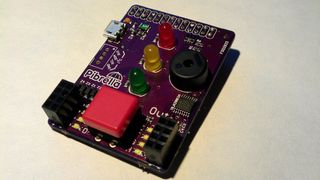
9. Cyntech Pibrella
Specifications
Reasons to buy
Reasons to avoid
Pibrella, released when the Raspberry Pi GPIO had only 26 pins, is the ideal way to introduce electronics and programming to young minds. Designed for the original Raspberry Pi, but compatible with all models of Pi, Pibrella provides us with a simple push button, three LEDs and a buzzer. Four inputs, and four outputs can be used with external components, including motors.
To program Pibrella we can use Python or Scratch and quickly bring a project to life. This Raspberry Pi HAT can be used to build simple robotic projects and teach logic, core concepts using the LEDs. The ideal board for kids who just want to build their first project.
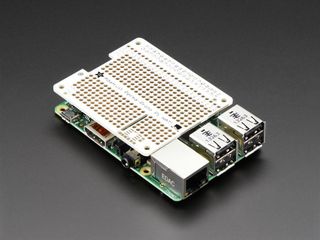
10. Adafruit Perma-Proto HAT
Specifications
Reasons to buy
Reasons to avoid
If you are a seasoned Raspberry Pi hacker, then you may have already taken your first steps into electronics using a breadboard. But where do you go from here? The answer is to create your own circuit board.
The Adafruit Perma-Proto HAT works with 40 pin GPIO Pi and provides a place where you can solder your own components to build a circuit. LEDs, buttons, motor drivers and more. This is a great way to take your skills to the next level and learn how to layout a circuit.
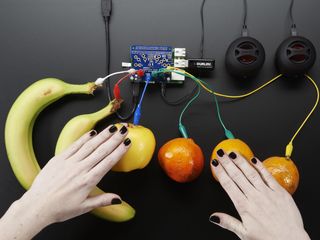
11. Adafruit Capacitive Touch HAT
Specifications
Reasons to buy
Reasons to avoid
Did you know that a banana can be an instrument? A watermelon can be a controller for a game? This and lots more is made possible using the Adafruit Capacitive Touch HAT. For use with all 40pin GPIO Pi, this HAT has 12 crocodile clip connectors which can be connected to objects that are conductive.
When a conductive object is touched, the Adafruit Capacitive Touch HAT detects a change in voltage and this triggers an action in your Python code. The classic project for this Raspberry Pi HAT is the Banana Piano which sees each banana representing a key. Touch the banana and the note for that key is played. The Python code is a little tricky to get right, but the fun with this board is limitless.
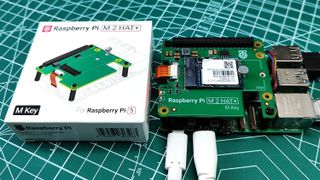
Specifications
Reasons to buy
Reasons to avoid
The official Raspberry Pi M.2 HAT+ board offers a low cost, $12, introduction to using NVMe SSDs on your Raspberry Pi 5. Fast, cheap and reliable storage is finally available for the new flagship Raspberry Pi and this board makes it easy to use.
Designed using the new HAT+ standard, a standard introduced with the Raspberry Pi 5, this board connects to the new PCIe port and provides a pass-through for the GPIO. GPIO access is fiddly, but it can be done. The HAT+ is also designed for use with the Active Cooler, so your Raspberry Pi 5 will keep cool.
Read: Raspberry Pi M.2 HAT+ Review
Finding Discounts on the Best Raspberry Pi HATs
Whether you're shopping for one of the best Raspberry Pi HATs or one that didn't quite make our list, you may find savings by checking out the latest SparkFun promo codes, Newegg promo codes, Amazon promo codes or Micro Center coupons.
MORE: Best microSD Cards for Raspberry Pi
MORE: Raspberry Pi Tutorials
Stay On the Cutting Edge: Get the Tom's Hardware Newsletter
Get Tom's Hardware's best news and in-depth reviews, straight to your inbox.
Les Pounder is an associate editor at Tom's Hardware. He is a creative technologist and for seven years has created projects to educate and inspire minds both young and old. He has worked with the Raspberry Pi Foundation to write and deliver their teacher training program "Picademy".
-
Pi-Plates Please also consider the TINKERplate HAT from Pi-Plates. This board has 2 relays, four 12 bit A/D inputs, and eight smart digital I/O ports. More information is available at https://pi-plates.com/tinkerplate/Reply -
romilly Like you I love the Pimoroni Explorer HAT - so much I wrote a book about how to use it :)Reply -
hansliss ReplyAdmin said:The Raspberry Pi HATs (Hardware Attached on Top) bring tons of extra functionality to your Pi. The best HATs allow you to build a retro gaming machine, develop an A.I., power a robot or just learn about programming.
Best Raspberry Pi HATs: Expansion Boards for Every Project : Read more
I suspect almost none of the devices you list are HATs. The HAT specification includes a mandatory serial EEPROM containing information about the board, and you are not allowed to call it a HAT without this EEPROM.
You can read about HATs here: https://github.com/raspberrypi/hats -
Garden-Gnome This article is quite old now and not fit for 2024. For example, item 5 the Pi Sense Hat as shown is version 1 and version 2 has been available for quite some time.Reply
